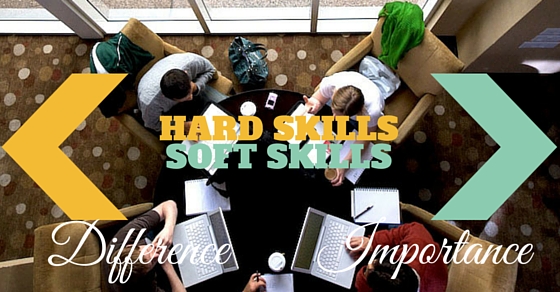Skills are the key element that a resume highlights. Employees need various skills to qualify for a decent job.
Employers generally list out a few basic skills which includes Hard and Soft skills. But what are these skills?
Probably every one of us must have heard of it somewhere. Let’s see what they actually mean.

What Does Hard Skills Mean? Opposite of Soft Skills:
Hard Skills are a set of special skills that are obtained through years of practice or learning. They can be said as skills that are needed for a specific task.
They can also be termed as technical skills or abilities for a certain professional or occupational fields. These skills are easily visible, tangible and well-defined. These skills vary from person to person in quality and quantity.
Acquiring good Hard Skills means higher IQ (Intelligence Quotient). It includes logical thinking, analytical thinking, programming, understanding, strategic thinking, planning etc.
What Does Soft Skills Mean?
Soft Skills on the other hand are a set of skills or traits that include frank behaviour, communicational skills, teamwork ability, management skills, appropriate attitude, etiquette, self-presentation, etc.
These are learnt on their own. Hard skills are taught in many institution but they make almost no contribution in developing soft skills.
Soft skills can be termed as personal attributes and grace that helps in maintaining better relation as well as a sense of harmony between people.
Difference Between Hard and Soft Skills:
1. See the difference?
Hard skill:
Hard skills require a higher level of IQ.
Example of such skills include qualification or masters in certain fields like math, accounts, finance, economics, biology, chemistry, statistics, etc
Soft skill:
Soft skills can be called the EQ or the Emotional Quotient of a person. It includes skills like time management skills, self-confidence, self-management, self-control, communication skills (Verbal communication), attitude, adaptability, as well as the ability to take criticism in appositive manner, etc.
2. Portable and flexible, is it?
Hard skills:
Hard skills are those that are constant and can be used in any environment with different types of people or workplaces.
Further hard skills can be viewed on the basis of qualifications and performance presented by the institution or the previous workplace. It can be explained in a simplified manner by an example.
If an employee possess the qualification for the task of computer programming then he doesn’t need to modify or learn anything else to work in the same field of different organization.
Soft skills:
On the other hand, soft skills need to be modified on the basis of different work environment, people and workplace. These skills are needed to be varied according to the company’s customs and policies.
For example, Communication skills are a part of soft skills. It greatly varies from person to person. The way to communicate varies on the basis of the audience one is working with.
Further the context in which the work is to be presented also differs the way of communication. For an instance you may be able to communicate well with co-workers and friendly employees but you may face trouble while projecting your ideas or work to the seniors (Managers or employers).
3. Learned or not?
Hard skills:
Acquiring hard skills come with a step-by-step guideline. The set rules make it possible to excel in obtaining hard skills.
Generally one learns hard skills at school. For an instance, one may aim to become a certified Public Accounted.
To attain this qualification one may start with simple accounting then might take a course in advanced accounting. And also work and gain enough experience to be qualified for the very post.
Soft skills:
On the contrary, soft skills have no set guidelines to follow and procure the skills. Soft skills are learnt through experience as well as maturity and understanding. One may fail at first but as said ‘Failure is the stepping stone to success‘.
One must have the ability to adapt in all kind of environment and should open up to learn new.
Further obtaining soft skill requires concentration and hard work as there is no available step-by-step beginners guide to it.
Importance of Hard and Soft Skills in Different Careers:
Hard and soft skills vary in requirements according to the field and career you are involved in.
1. More hard skills and less soft skills:
There are people who work excellently in their field but fail miserably in teamwork or group task. These are the people who have more hard skills and less soft skills and are yet successful in their careers.
Hard skills examples of such people in different career are physicians, engineers, scientists etc.
2. Equal Hard and Soft skills needing professions:
These are the people who require both the set of skills. For an instance, people from accounting or law profession need both the skills equally.
These people need a good knowledge of the techniques of accounting or different laws respective to their career.
At the same time they need thoroughly good soft skills which may help in dealing with possible clients. Further it is the soft skill that is enhancing the hard ones.
Similarly, the profession of doctors demands them to have an eminent knowledge of medicines as well enough skills to deal with patients requiring emotional help.
3. Lesser hard skill and more of soft skills:
These are the careers that need very less hard skills and more of soft skills presentation like communication skills and networking skills. These are the people who often belong to the sales and marketing department.
To sell a certain product all they need is good marketing of the product and convincing demo. They might have the least knowledge about the product but they wouldn’t mind as they have the skills to read, convince and persuade their customers to make a deal.
Soft Skill Types:
Soft skills can be further divided into two separate categories. They are-
1. Self-actualization:
Emotion can make or break you. The skill to manage our emotion is one of the soft skills that one should learn.
It is important to have a positive perception of oneself. Soft skills examples are stress management, self-esteem, emotional and behavioral control, etc.
2. Communicative skills:
These are not the skills used to manipulate ones’ image in other’s mind, but it is the ability to be confident in conducts.
Further, employers always look for committed candidates who can contribute to the constant improvement in the workplace. Soft skills give you the confidence to express as well as respond to the expectation.
Examples of such soft skills may include communication, leadership, and teamwork skills. Along with it, one also needs the ability to handle difficult personalities.
Tips for Better Soft Skills:
As we learnt earlier, soft skills are very important for the advancement of one’s career. But what are the ways to enhance the soft skills.
1. Aim for targets in hierarchical manner:
‘Aim big‘ is what people generally say, but here do the exact opposite. Don’t try to make a leap for higher positions. Similarly, improvements cannot be made in soft skills within a short period of time.
Thus, focusing on a single soft skill at a time is an ideal way to begin with. Further, aiming for more may result in defeated attitude because of the dissatisfaction of incomplete task.
2. Try to be in other’s shoes:
If you begin with communication as your targeted skill, then you may start with putting yourself in other’s shoes.
Their motivation, their insecurity, their challenges etc., these factors may also help in making you able to understand your flaws in communication compared to them.
Thus, understanding the loops of others communication and implementing such in your progress will help you in improving your communication.
3. Self-awareness is the key:
Understanding where you lack is a very important question. Try to note down your reaction that are triggered in various situations.
Try to figure out the way in which people trigger certain emotions like stress, anger, irritation, awkwardness etc in you.
For developing better self management skills, one must first learn to understand oneself in depth. Change is not a fast process and so patience is very much needed.
4. Change begins with oneself:
When you think of change, it definitely starts with your inner self. As we have learnt earlier patience is very much needed when it comes to proceeding or implementing a certain change.
It is usually believed that change takes place only when everyone contributes to it, but here it doesn’t work that way. For a change in oneself, one must rigorously strive to make a difference.
Some people may have this misconception regarding soft skills. They accuse soft skills of being a manipulative factor.
Of course it is untrue as improving soft skills is only about the change one brings in within yourself, your thoughts, attitude, perception and approach to various situations
Every action has a reaction thus, people’s reaction only change when you show a certain change in yourself first.
How would one make a change in soft skills?
By practicing the skills you want to attain. After all, soft skills are not easily attainable.
Improving soft skills is almost like changing the thought process as well as the behavior. Everyday is an opportunity to practice soft skill with other employees or the people around you.
5. Emotional aspect:
This skill does not have any set rules or guidelines unlike the hard skills, like math, where the perfection is attained by the same rule all the time.
An effective change in soft skill solely depends on the emotional chaos and condition, external situation, and the type of people one encounters on everyday basis.
6. Flexible:
Soft skills are flexible in nature. They differ according to the audiences.
These skills are valuable to any career as soft skills enhances the inner strength, energy and interpersonal relations. As long as teamwork is involved in job description these skills are pivotal to your career.
7. Pressure handling:
Learn to handle pressure. Time never stops and thus one should be able to manage time. At times there may be a pile of work lying on your desk.
That is your queue to practice the skill of time management. Not every one can handle pressure with ease. One should strive in developing this certain skill.
Further, it gives an opportunity to test the skill of prioritizing and allocating adequate time to the targets. It will enhance your flexibility as well as prepare you to handle challenges in work and life both.
8. Learning never stops:
‘Learning never stops‘, is a very famous saying, which can also be used as a motto. The process of adapting soft skills is a non stop action.
One can reach the goal of proficiency in it but there are always chances of encountering new situations. Further, may be situations are created in order to test your skills and help you learn better.
To Wrap Up:
In today’s time not many people give importance to the soft skills, but one should not have the misconception that acquiring hard skill is the only requirement employers look forward too.
Even though the academic qualifications fit your dream job, but the adequate soft skills are of equal importance. Soft skill and hard skill both are equally important or may be a 60-40 relationship.
Soft skills when combined with hard skills they together strengthens the person. It not only benefits in striving for advancements in jobs or career level but also nourishes your mind with peace and harmony.
Hard skills can help in completing work better whereas soft skill helps in slyly making your way to the top of the hierarchy.
Further, one should have an idea of using both hard and soft skill properly in the time of need. Thus, both skills are equal companion on the road towards peace and success.







































